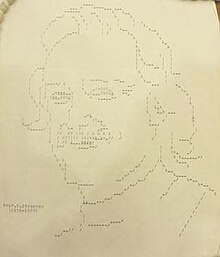
Back كريستوفر ستراشى ARZ Christopher Strachey German Christopher Strachey Spanish Christopher Strachey French Christopher Strachey Italian クリストファー・ストレイチー Japanese 크리스토퍼 스트래치 Korean Christopher Strachey Malagasy Christopher Strachey Romanian 克里斯托弗·斯特雷奇 Chinese
Christopher Strachey | |
|---|---|
 Early computer printout of Christopher Strachey in the Bodleian Library, Oxford | |
| Born | 16 November 1916 Hampstead, England |
| Died | 18 May 1975 (aged 58) Oxford, England |
| Citizenship | British |
| Education | Gresham's School |
| Alma mater | University of Cambridge (BA) |
| Known for | CPL, denotational semantics, Fundamental Concepts in Programming Languages, time-sharing |
| Parent(s) | Oliver Strachey Ray Costelloe |
| Scientific career | |
| Fields | Computer Science |
| Institutions | University of Cambridge, University of Oxford St Edmund's School, Canterbury Harrow School |
| Doctoral students | Peter Mosses David Turner |
Christopher S. Strachey (/ˈstreɪtʃi/; 16 November 1916 – 18 May 1975) was a British computer scientist.[1][2][3] He was one of the founders of denotational semantics, and a pioneer in programming language design and computer time-sharing.[4] He has also been credited as possibly being the first developer of a video game[5] and for coining terms such as polymorphism and referential transparency that are still widely used by developers today.[6] He was a member of the Strachey family, prominent in government, arts, administration, and academia.
- ^ Christopher Strachey: British computer scientist, Encyclopædia Britannica.
- ^ Catalogue of the papers and correspondence of Christopher Strachey (1916–1975), The National Archives, United Kingdom.
- ^ Gordon, M.J.C., Christopher Strachey: Recollections of His Influence, Higher-Order and Symbolic Computation, 13(1–2):65–67, April 2000. ISSN 1388-3690. (PostScript version Archived 13 March 2017 at the Wayback Machine.)
- ^ F. J. Corbató, et al., The Compatible Time-Sharing System A Programmer's Guide (MIT Press, 1963) ISBN 978-0-262-03008-3. "the first paper on time-shared computers by C. Strachey at the June 1959 UNESCO Information Processing conference"
- ^ Brown, Stuart (4 October 2019). "The First Video Game". YouTube. Archived from the original on 4 October 2019. Retrieved 19 January 2022.
- ^ Strachey, Christopher (1967). Fundamental Concepts in Programming Languages (Technical report). Lecture notes for the International Summer School in Computer Programming at Copenhagen.